Promoting ATSI Cultural Safety: A Nursing Diploma Project
VerifiedAdded on 2022/08/18
|16
|4391
|14
Project
AI Summary
This project delves into the critical aspects of Aboriginal and Torres Strait Islander (ATSI) cultural safety within the Australian healthcare system, particularly in nursing. It highlights the historical impacts of European settlement on ATSI communities, including the loss of land, culture, and the resulting social and emotional trauma. The project examines the disparities in health outcomes between Indigenous and non-Indigenous Australians, attributing these to factors like racial discrimination, historical injustices, and compromised access to culturally appropriate healthcare. Furthermore, it evaluates strategies for measuring and improving cultural safety, such as cultural safety training programs and the Safety Culture Indicator Scale Measurement System. The project also assesses initiatives like the Royal Australian College of General Practitioners (RACGP) program aimed at enhancing cultural understanding among healthcare practitioners. It emphasizes the importance of addressing systemic racial discrimination and involving Indigenous community members in the development and implementation of culturally sensitive healthcare practices. This assignment provides valuable insights into promoting cultural safety and improving health outcomes for ATSI individuals.
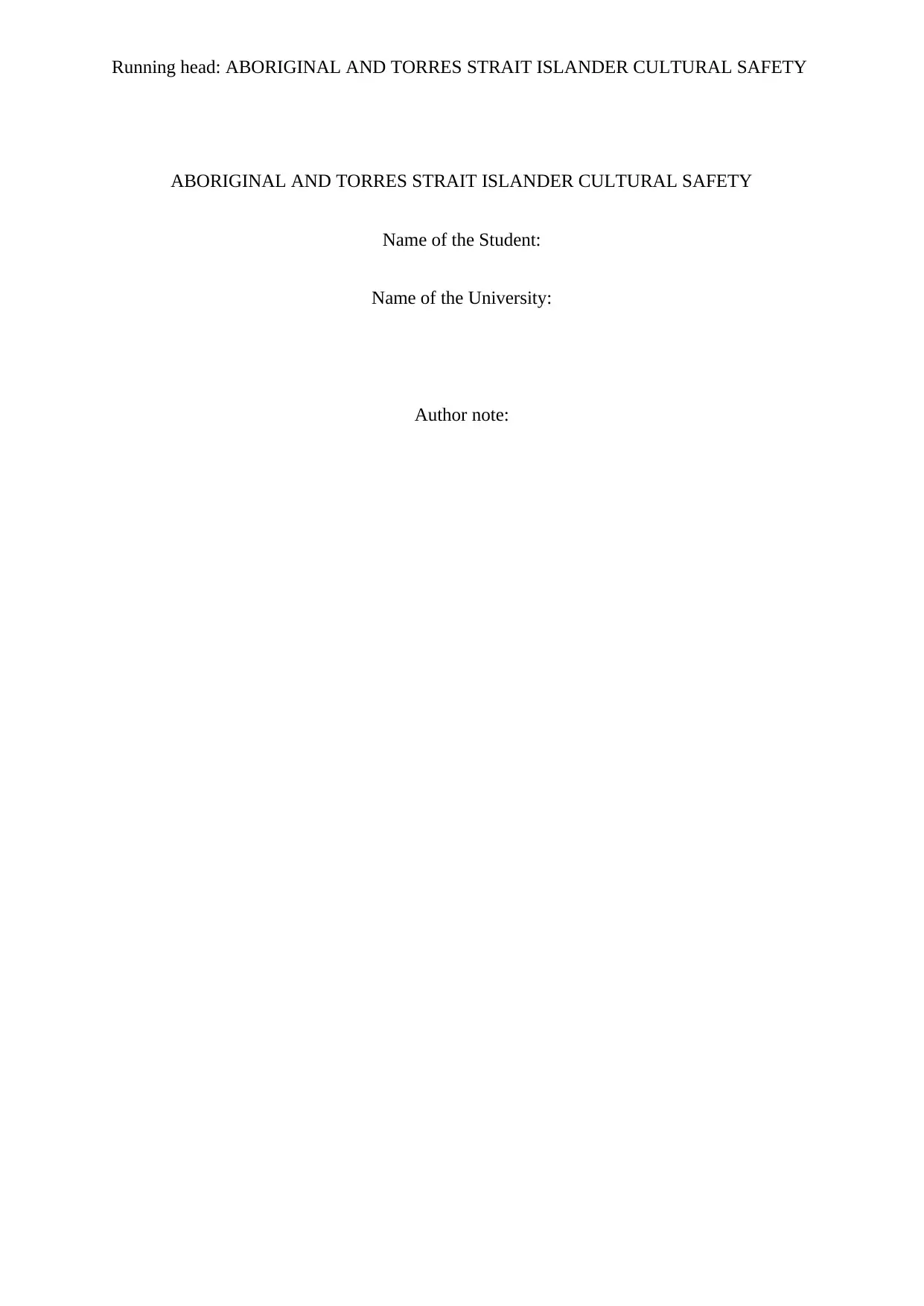
Running head: ABORIGINAL AND TORRES STRAIT ISLANDER CULTURAL SAFETY
ABORIGINAL AND TORRES STRAIT ISLANDER CULTURAL SAFETY
Name of the Student:
Name of the University:
Author note:
ABORIGINAL AND TORRES STRAIT ISLANDER CULTURAL SAFETY
Name of the Student:
Name of the University:
Author note:
Paraphrase This Document
Need a fresh take? Get an instant paraphrase of this document with our AI Paraphraser
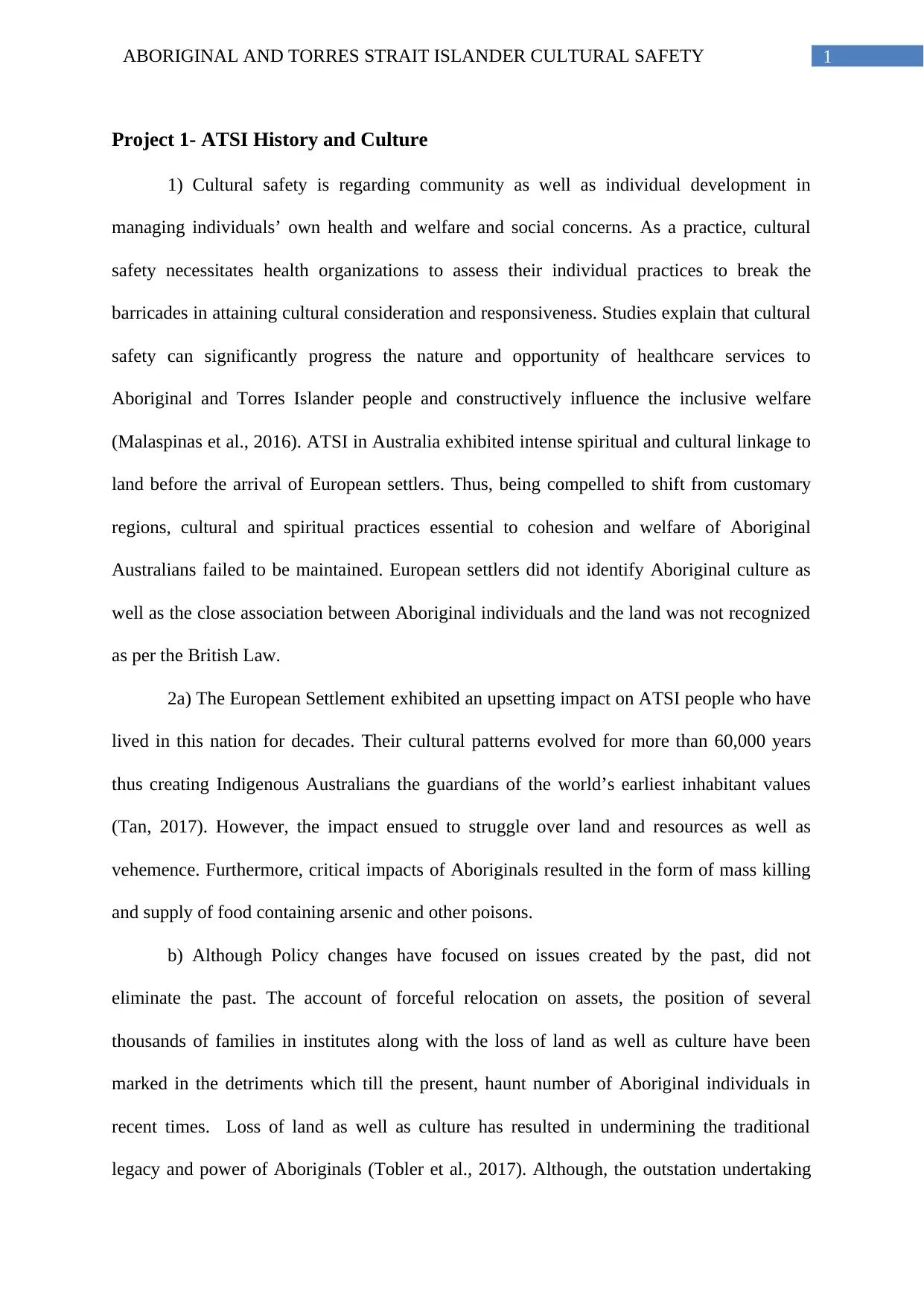
1ABORIGINAL AND TORRES STRAIT ISLANDER CULTURAL SAFETY
Project 1- ATSI History and Culture
1) Cultural safety is regarding community as well as individual development in
managing individuals’ own health and welfare and social concerns. As a practice, cultural
safety necessitates health organizations to assess their individual practices to break the
barricades in attaining cultural consideration and responsiveness. Studies explain that cultural
safety can significantly progress the nature and opportunity of healthcare services to
Aboriginal and Torres Islander people and constructively influence the inclusive welfare
(Malaspinas et al., 2016). ATSI in Australia exhibited intense spiritual and cultural linkage to
land before the arrival of European settlers. Thus, being compelled to shift from customary
regions, cultural and spiritual practices essential to cohesion and welfare of Aboriginal
Australians failed to be maintained. European settlers did not identify Aboriginal culture as
well as the close association between Aboriginal individuals and the land was not recognized
as per the British Law.
2a) The European Settlement exhibited an upsetting impact on ATSI people who have
lived in this nation for decades. Their cultural patterns evolved for more than 60,000 years
thus creating Indigenous Australians the guardians of the world’s earliest inhabitant values
(Tan, 2017). However, the impact ensued to struggle over land and resources as well as
vehemence. Furthermore, critical impacts of Aboriginals resulted in the form of mass killing
and supply of food containing arsenic and other poisons.
b) Although Policy changes have focused on issues created by the past, did not
eliminate the past. The account of forceful relocation on assets, the position of several
thousands of families in institutes along with the loss of land as well as culture have been
marked in the detriments which till the present, haunt number of Aboriginal individuals in
recent times. Loss of land as well as culture has resulted in undermining the traditional
legacy and power of Aboriginals (Tobler et al., 2017). Although, the outstation undertaking
Project 1- ATSI History and Culture
1) Cultural safety is regarding community as well as individual development in
managing individuals’ own health and welfare and social concerns. As a practice, cultural
safety necessitates health organizations to assess their individual practices to break the
barricades in attaining cultural consideration and responsiveness. Studies explain that cultural
safety can significantly progress the nature and opportunity of healthcare services to
Aboriginal and Torres Islander people and constructively influence the inclusive welfare
(Malaspinas et al., 2016). ATSI in Australia exhibited intense spiritual and cultural linkage to
land before the arrival of European settlers. Thus, being compelled to shift from customary
regions, cultural and spiritual practices essential to cohesion and welfare of Aboriginal
Australians failed to be maintained. European settlers did not identify Aboriginal culture as
well as the close association between Aboriginal individuals and the land was not recognized
as per the British Law.
2a) The European Settlement exhibited an upsetting impact on ATSI people who have
lived in this nation for decades. Their cultural patterns evolved for more than 60,000 years
thus creating Indigenous Australians the guardians of the world’s earliest inhabitant values
(Tan, 2017). However, the impact ensued to struggle over land and resources as well as
vehemence. Furthermore, critical impacts of Aboriginals resulted in the form of mass killing
and supply of food containing arsenic and other poisons.
b) Although Policy changes have focused on issues created by the past, did not
eliminate the past. The account of forceful relocation on assets, the position of several
thousands of families in institutes along with the loss of land as well as culture have been
marked in the detriments which till the present, haunt number of Aboriginal individuals in
recent times. Loss of land as well as culture has resulted in undermining the traditional
legacy and power of Aboriginals (Tobler et al., 2017). Although, the outstation undertaking
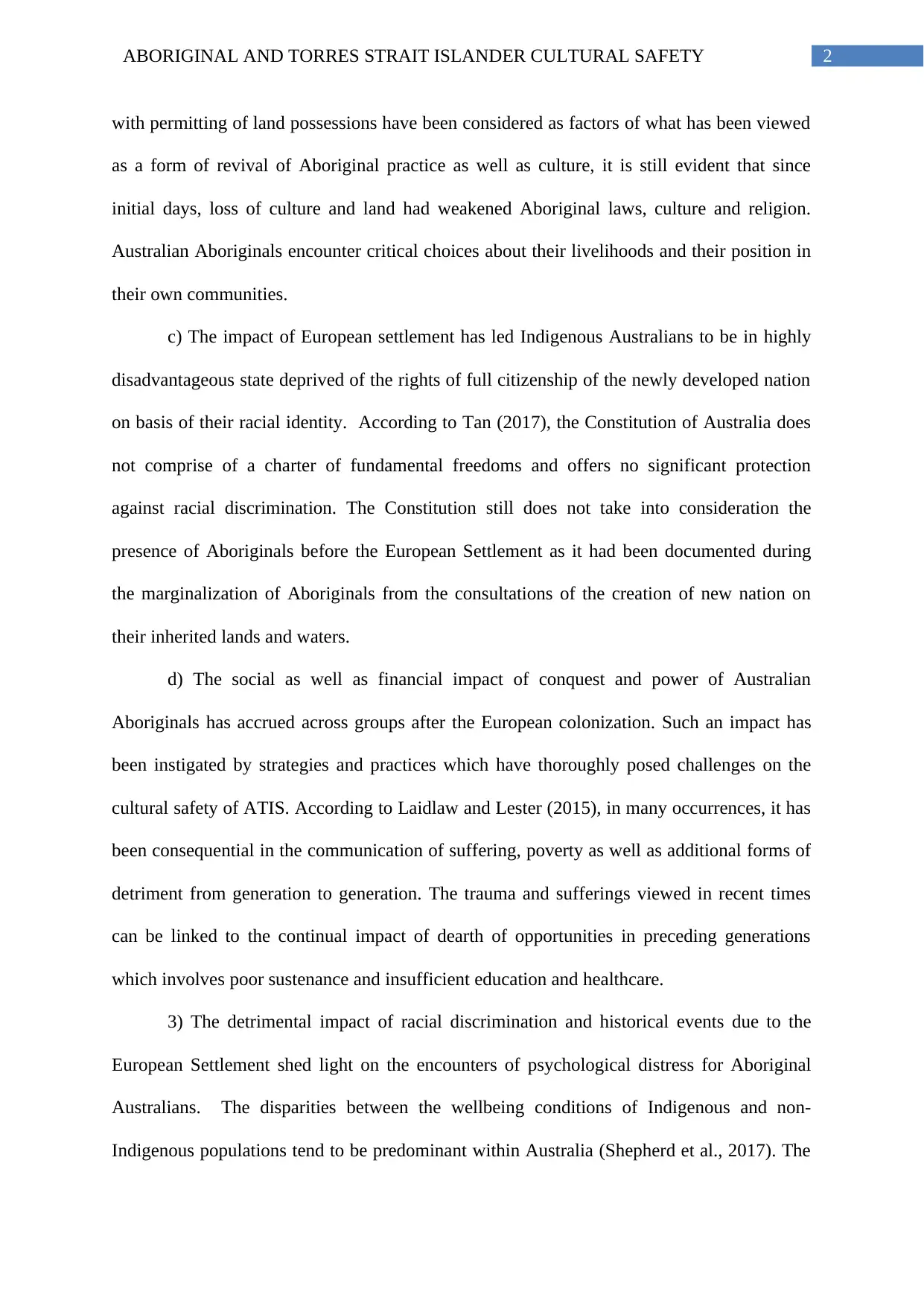
2ABORIGINAL AND TORRES STRAIT ISLANDER CULTURAL SAFETY
with permitting of land possessions have been considered as factors of what has been viewed
as a form of revival of Aboriginal practice as well as culture, it is still evident that since
initial days, loss of culture and land had weakened Aboriginal laws, culture and religion.
Australian Aboriginals encounter critical choices about their livelihoods and their position in
their own communities.
c) The impact of European settlement has led Indigenous Australians to be in highly
disadvantageous state deprived of the rights of full citizenship of the newly developed nation
on basis of their racial identity. According to Tan (2017), the Constitution of Australia does
not comprise of a charter of fundamental freedoms and offers no significant protection
against racial discrimination. The Constitution still does not take into consideration the
presence of Aboriginals before the European Settlement as it had been documented during
the marginalization of Aboriginals from the consultations of the creation of new nation on
their inherited lands and waters.
d) The social as well as financial impact of conquest and power of Australian
Aboriginals has accrued across groups after the European colonization. Such an impact has
been instigated by strategies and practices which have thoroughly posed challenges on the
cultural safety of ATIS. According to Laidlaw and Lester (2015), in many occurrences, it has
been consequential in the communication of suffering, poverty as well as additional forms of
detriment from generation to generation. The trauma and sufferings viewed in recent times
can be linked to the continual impact of dearth of opportunities in preceding generations
which involves poor sustenance and insufficient education and healthcare.
3) The detrimental impact of racial discrimination and historical events due to the
European Settlement shed light on the encounters of psychological distress for Aboriginal
Australians. The disparities between the wellbeing conditions of Indigenous and non-
Indigenous populations tend to be predominant within Australia (Shepherd et al., 2017). The
with permitting of land possessions have been considered as factors of what has been viewed
as a form of revival of Aboriginal practice as well as culture, it is still evident that since
initial days, loss of culture and land had weakened Aboriginal laws, culture and religion.
Australian Aboriginals encounter critical choices about their livelihoods and their position in
their own communities.
c) The impact of European settlement has led Indigenous Australians to be in highly
disadvantageous state deprived of the rights of full citizenship of the newly developed nation
on basis of their racial identity. According to Tan (2017), the Constitution of Australia does
not comprise of a charter of fundamental freedoms and offers no significant protection
against racial discrimination. The Constitution still does not take into consideration the
presence of Aboriginals before the European Settlement as it had been documented during
the marginalization of Aboriginals from the consultations of the creation of new nation on
their inherited lands and waters.
d) The social as well as financial impact of conquest and power of Australian
Aboriginals has accrued across groups after the European colonization. Such an impact has
been instigated by strategies and practices which have thoroughly posed challenges on the
cultural safety of ATIS. According to Laidlaw and Lester (2015), in many occurrences, it has
been consequential in the communication of suffering, poverty as well as additional forms of
detriment from generation to generation. The trauma and sufferings viewed in recent times
can be linked to the continual impact of dearth of opportunities in preceding generations
which involves poor sustenance and insufficient education and healthcare.
3) The detrimental impact of racial discrimination and historical events due to the
European Settlement shed light on the encounters of psychological distress for Aboriginal
Australians. The disparities between the wellbeing conditions of Indigenous and non-
Indigenous populations tend to be predominant within Australia (Shepherd et al., 2017). The
⊘ This is a preview!⊘
Do you want full access?
Subscribe today to unlock all pages.

Trusted by 1+ million students worldwide
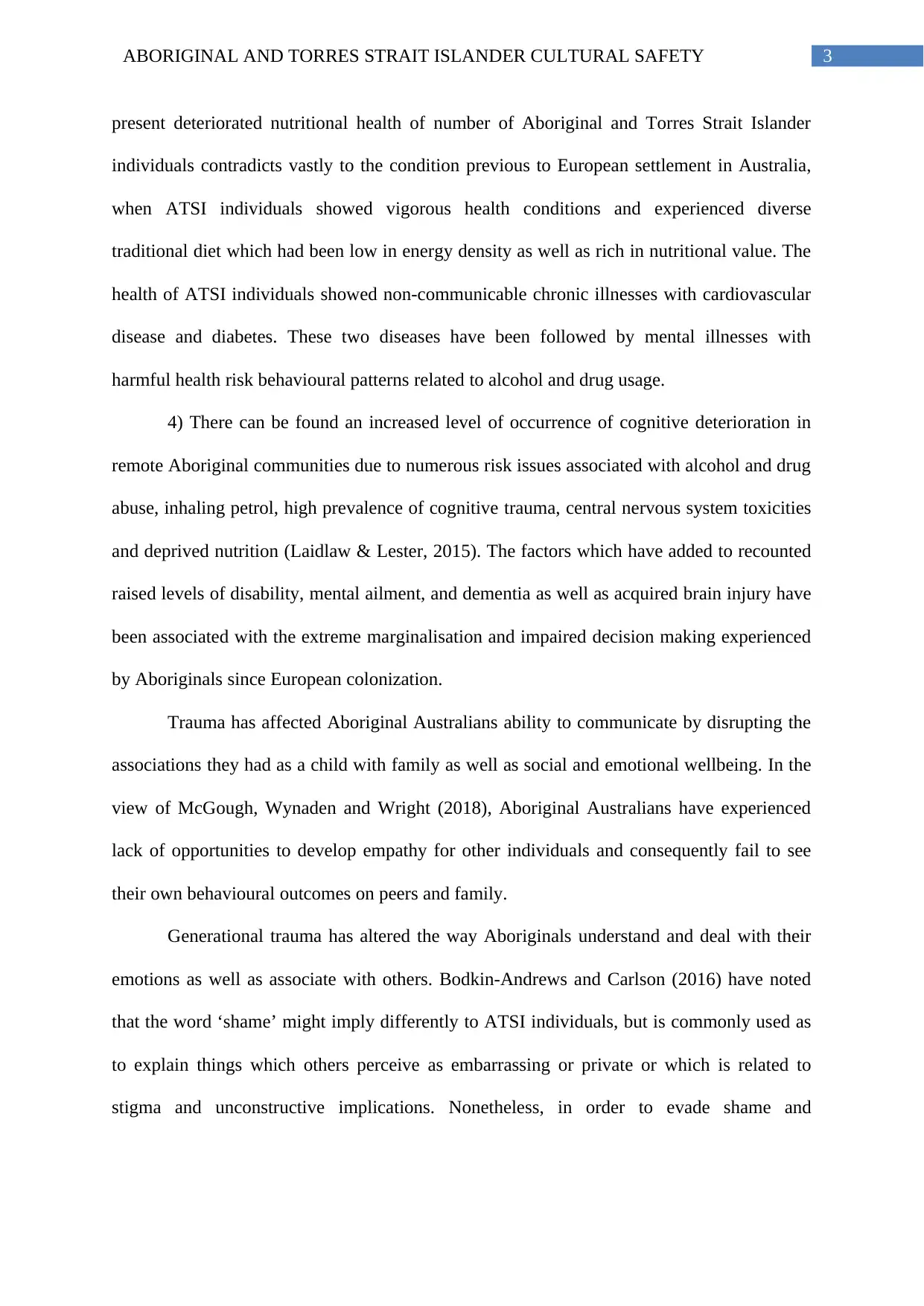
3ABORIGINAL AND TORRES STRAIT ISLANDER CULTURAL SAFETY
present deteriorated nutritional health of number of Aboriginal and Torres Strait Islander
individuals contradicts vastly to the condition previous to European settlement in Australia,
when ATSI individuals showed vigorous health conditions and experienced diverse
traditional diet which had been low in energy density as well as rich in nutritional value. The
health of ATSI individuals showed non-communicable chronic illnesses with cardiovascular
disease and diabetes. These two diseases have been followed by mental illnesses with
harmful health risk behavioural patterns related to alcohol and drug usage.
4) There can be found an increased level of occurrence of cognitive deterioration in
remote Aboriginal communities due to numerous risk issues associated with alcohol and drug
abuse, inhaling petrol, high prevalence of cognitive trauma, central nervous system toxicities
and deprived nutrition (Laidlaw & Lester, 2015). The factors which have added to recounted
raised levels of disability, mental ailment, and dementia as well as acquired brain injury have
been associated with the extreme marginalisation and impaired decision making experienced
by Aboriginals since European colonization.
Trauma has affected Aboriginal Australians ability to communicate by disrupting the
associations they had as a child with family as well as social and emotional wellbeing. In the
view of McGough, Wynaden and Wright (2018), Aboriginal Australians have experienced
lack of opportunities to develop empathy for other individuals and consequently fail to see
their own behavioural outcomes on peers and family.
Generational trauma has altered the way Aboriginals understand and deal with their
emotions as well as associate with others. Bodkin-Andrews and Carlson (2016) have noted
that the word ‘shame’ might imply differently to ATSI individuals, but is commonly used as
to explain things which others perceive as embarrassing or private or which is related to
stigma and unconstructive implications. Nonetheless, in order to evade shame and
present deteriorated nutritional health of number of Aboriginal and Torres Strait Islander
individuals contradicts vastly to the condition previous to European settlement in Australia,
when ATSI individuals showed vigorous health conditions and experienced diverse
traditional diet which had been low in energy density as well as rich in nutritional value. The
health of ATSI individuals showed non-communicable chronic illnesses with cardiovascular
disease and diabetes. These two diseases have been followed by mental illnesses with
harmful health risk behavioural patterns related to alcohol and drug usage.
4) There can be found an increased level of occurrence of cognitive deterioration in
remote Aboriginal communities due to numerous risk issues associated with alcohol and drug
abuse, inhaling petrol, high prevalence of cognitive trauma, central nervous system toxicities
and deprived nutrition (Laidlaw & Lester, 2015). The factors which have added to recounted
raised levels of disability, mental ailment, and dementia as well as acquired brain injury have
been associated with the extreme marginalisation and impaired decision making experienced
by Aboriginals since European colonization.
Trauma has affected Aboriginal Australians ability to communicate by disrupting the
associations they had as a child with family as well as social and emotional wellbeing. In the
view of McGough, Wynaden and Wright (2018), Aboriginal Australians have experienced
lack of opportunities to develop empathy for other individuals and consequently fail to see
their own behavioural outcomes on peers and family.
Generational trauma has altered the way Aboriginals understand and deal with their
emotions as well as associate with others. Bodkin-Andrews and Carlson (2016) have noted
that the word ‘shame’ might imply differently to ATSI individuals, but is commonly used as
to explain things which others perceive as embarrassing or private or which is related to
stigma and unconstructive implications. Nonetheless, in order to evade shame and
Paraphrase This Document
Need a fresh take? Get an instant paraphrase of this document with our AI Paraphraser
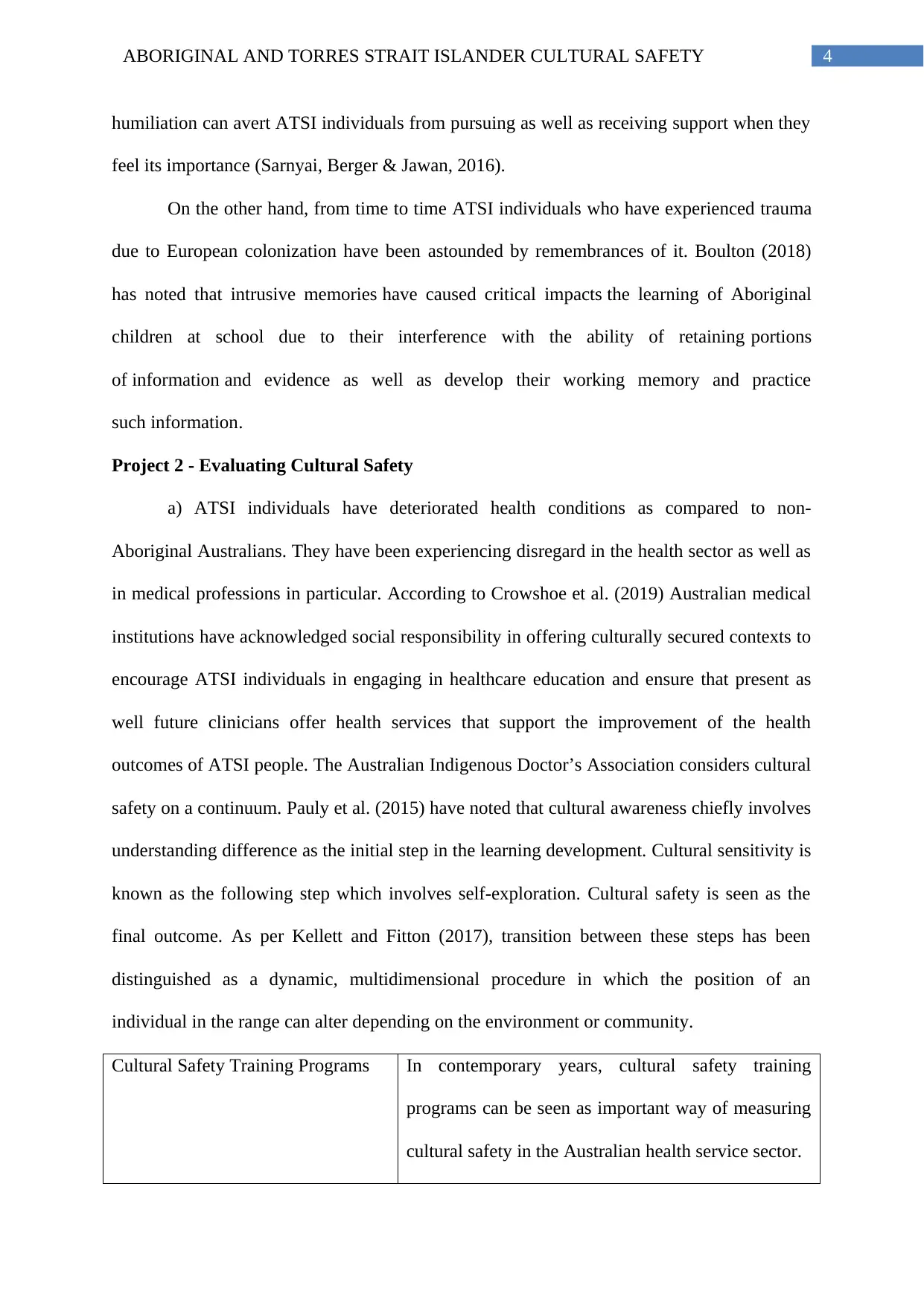
4ABORIGINAL AND TORRES STRAIT ISLANDER CULTURAL SAFETY
humiliation can avert ATSI individuals from pursuing as well as receiving support when they
feel its importance (Sarnyai, Berger & Jawan, 2016).
On the other hand, from time to time ATSI individuals who have experienced trauma
due to European colonization have been astounded by remembrances of it. Boulton (2018)
has noted that intrusive memories have caused critical impacts the learning of Aboriginal
children at school due to their interference with the ability of retaining portions
of information and evidence as well as develop their working memory and practice
such information.
Project 2 - Evaluating Cultural Safety
a) ATSI individuals have deteriorated health conditions as compared to non-
Aboriginal Australians. They have been experiencing disregard in the health sector as well as
in medical professions in particular. According to Crowshoe et al. (2019) Australian medical
institutions have acknowledged social responsibility in offering culturally secured contexts to
encourage ATSI individuals in engaging in healthcare education and ensure that present as
well future clinicians offer health services that support the improvement of the health
outcomes of ATSI people. The Australian Indigenous Doctor’s Association considers cultural
safety on a continuum. Pauly et al. (2015) have noted that cultural awareness chiefly involves
understanding difference as the initial step in the learning development. Cultural sensitivity is
known as the following step which involves self-exploration. Cultural safety is seen as the
final outcome. As per Kellett and Fitton (2017), transition between these steps has been
distinguished as a dynamic, multidimensional procedure in which the position of an
individual in the range can alter depending on the environment or community.
Cultural Safety Training Programs In contemporary years, cultural safety training
programs can be seen as important way of measuring
cultural safety in the Australian health service sector.
humiliation can avert ATSI individuals from pursuing as well as receiving support when they
feel its importance (Sarnyai, Berger & Jawan, 2016).
On the other hand, from time to time ATSI individuals who have experienced trauma
due to European colonization have been astounded by remembrances of it. Boulton (2018)
has noted that intrusive memories have caused critical impacts the learning of Aboriginal
children at school due to their interference with the ability of retaining portions
of information and evidence as well as develop their working memory and practice
such information.
Project 2 - Evaluating Cultural Safety
a) ATSI individuals have deteriorated health conditions as compared to non-
Aboriginal Australians. They have been experiencing disregard in the health sector as well as
in medical professions in particular. According to Crowshoe et al. (2019) Australian medical
institutions have acknowledged social responsibility in offering culturally secured contexts to
encourage ATSI individuals in engaging in healthcare education and ensure that present as
well future clinicians offer health services that support the improvement of the health
outcomes of ATSI people. The Australian Indigenous Doctor’s Association considers cultural
safety on a continuum. Pauly et al. (2015) have noted that cultural awareness chiefly involves
understanding difference as the initial step in the learning development. Cultural sensitivity is
known as the following step which involves self-exploration. Cultural safety is seen as the
final outcome. As per Kellett and Fitton (2017), transition between these steps has been
distinguished as a dynamic, multidimensional procedure in which the position of an
individual in the range can alter depending on the environment or community.
Cultural Safety Training Programs In contemporary years, cultural safety training
programs can be seen as important way of measuring
cultural safety in the Australian health service sector.
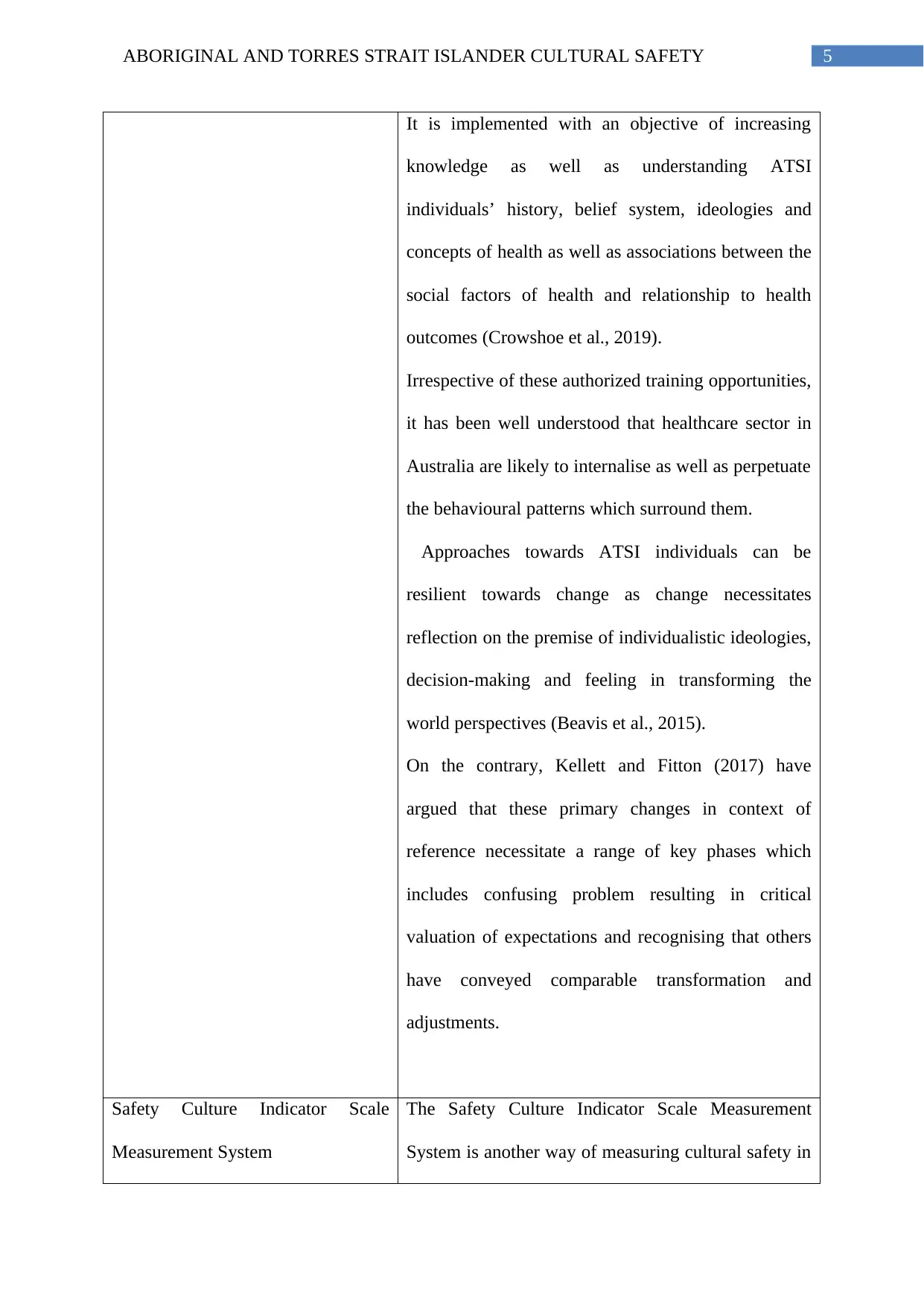
5ABORIGINAL AND TORRES STRAIT ISLANDER CULTURAL SAFETY
It is implemented with an objective of increasing
knowledge as well as understanding ATSI
individuals’ history, belief system, ideologies and
concepts of health as well as associations between the
social factors of health and relationship to health
outcomes (Crowshoe et al., 2019).
Irrespective of these authorized training opportunities,
it has been well understood that healthcare sector in
Australia are likely to internalise as well as perpetuate
the behavioural patterns which surround them.
Approaches towards ATSI individuals can be
resilient towards change as change necessitates
reflection on the premise of individualistic ideologies,
decision-making and feeling in transforming the
world perspectives (Beavis et al., 2015).
On the contrary, Kellett and Fitton (2017) have
argued that these primary changes in context of
reference necessitate a range of key phases which
includes confusing problem resulting in critical
valuation of expectations and recognising that others
have conveyed comparable transformation and
adjustments.
Safety Culture Indicator Scale
Measurement System
The Safety Culture Indicator Scale Measurement
System is another way of measuring cultural safety in
It is implemented with an objective of increasing
knowledge as well as understanding ATSI
individuals’ history, belief system, ideologies and
concepts of health as well as associations between the
social factors of health and relationship to health
outcomes (Crowshoe et al., 2019).
Irrespective of these authorized training opportunities,
it has been well understood that healthcare sector in
Australia are likely to internalise as well as perpetuate
the behavioural patterns which surround them.
Approaches towards ATSI individuals can be
resilient towards change as change necessitates
reflection on the premise of individualistic ideologies,
decision-making and feeling in transforming the
world perspectives (Beavis et al., 2015).
On the contrary, Kellett and Fitton (2017) have
argued that these primary changes in context of
reference necessitate a range of key phases which
includes confusing problem resulting in critical
valuation of expectations and recognising that others
have conveyed comparable transformation and
adjustments.
Safety Culture Indicator Scale
Measurement System
The Safety Culture Indicator Scale Measurement
System is another way of measuring cultural safety in
⊘ This is a preview!⊘
Do you want full access?
Subscribe today to unlock all pages.

Trusted by 1+ million students worldwide
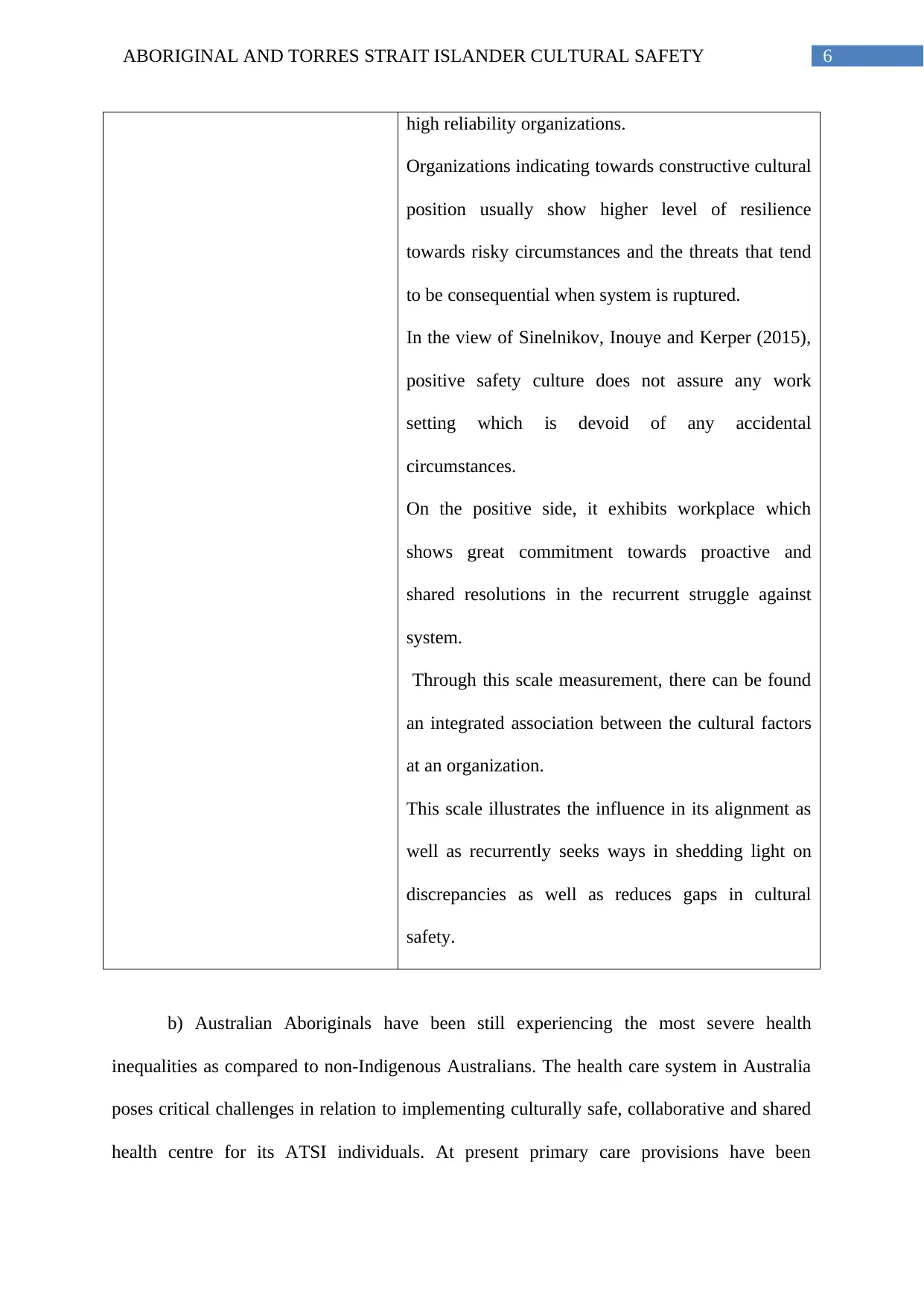
6ABORIGINAL AND TORRES STRAIT ISLANDER CULTURAL SAFETY
high reliability organizations.
Organizations indicating towards constructive cultural
position usually show higher level of resilience
towards risky circumstances and the threats that tend
to be consequential when system is ruptured.
In the view of Sinelnikov, Inouye and Kerper (2015),
positive safety culture does not assure any work
setting which is devoid of any accidental
circumstances.
On the positive side, it exhibits workplace which
shows great commitment towards proactive and
shared resolutions in the recurrent struggle against
system.
Through this scale measurement, there can be found
an integrated association between the cultural factors
at an organization.
This scale illustrates the influence in its alignment as
well as recurrently seeks ways in shedding light on
discrepancies as well as reduces gaps in cultural
safety.
b) Australian Aboriginals have been still experiencing the most severe health
inequalities as compared to non-Indigenous Australians. The health care system in Australia
poses critical challenges in relation to implementing culturally safe, collaborative and shared
health centre for its ATSI individuals. At present primary care provisions have been
high reliability organizations.
Organizations indicating towards constructive cultural
position usually show higher level of resilience
towards risky circumstances and the threats that tend
to be consequential when system is ruptured.
In the view of Sinelnikov, Inouye and Kerper (2015),
positive safety culture does not assure any work
setting which is devoid of any accidental
circumstances.
On the positive side, it exhibits workplace which
shows great commitment towards proactive and
shared resolutions in the recurrent struggle against
system.
Through this scale measurement, there can be found
an integrated association between the cultural factors
at an organization.
This scale illustrates the influence in its alignment as
well as recurrently seeks ways in shedding light on
discrepancies as well as reduces gaps in cultural
safety.
b) Australian Aboriginals have been still experiencing the most severe health
inequalities as compared to non-Indigenous Australians. The health care system in Australia
poses critical challenges in relation to implementing culturally safe, collaborative and shared
health centre for its ATSI individuals. At present primary care provisions have been
Paraphrase This Document
Need a fresh take? Get an instant paraphrase of this document with our AI Paraphraser
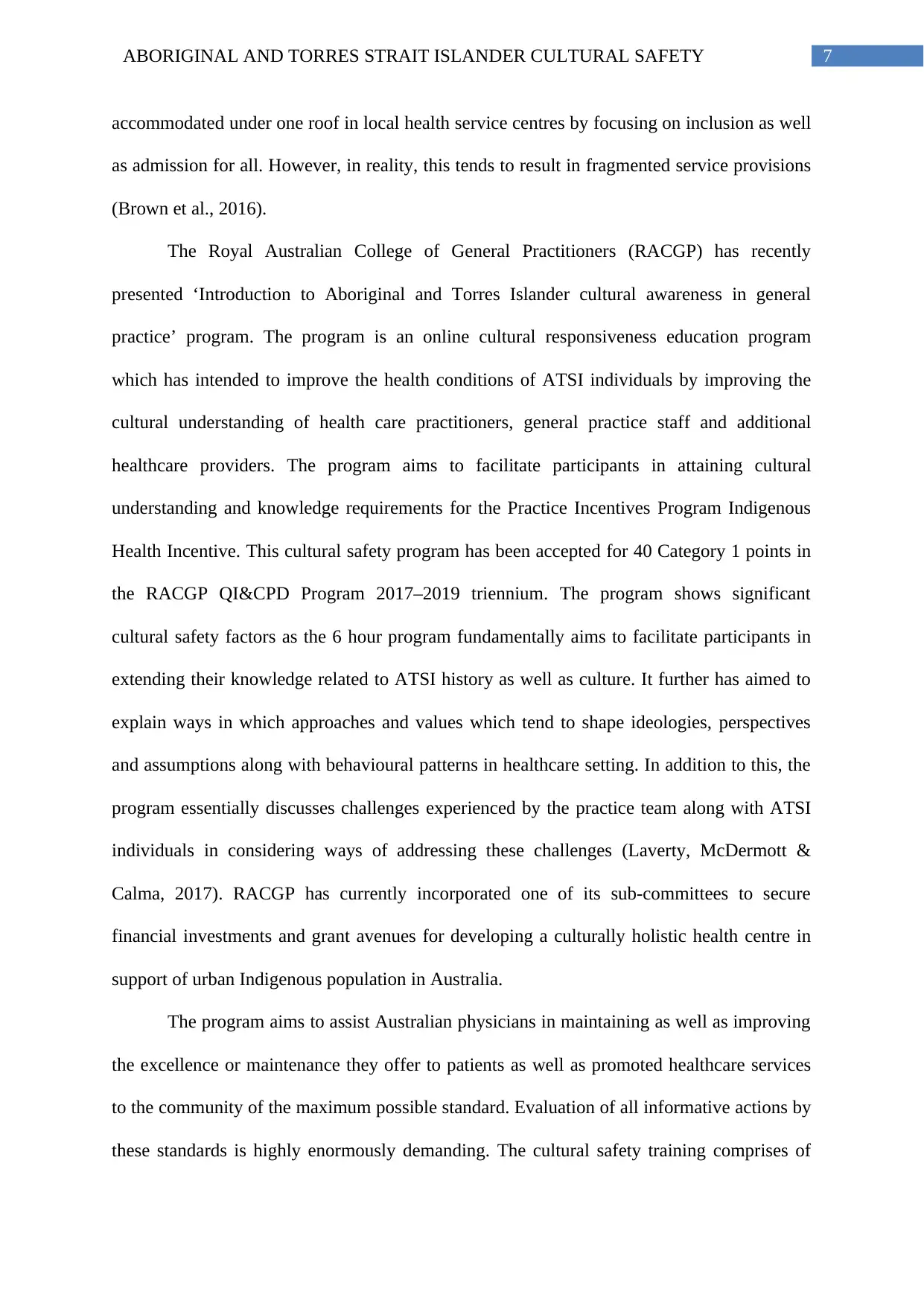
7ABORIGINAL AND TORRES STRAIT ISLANDER CULTURAL SAFETY
accommodated under one roof in local health service centres by focusing on inclusion as well
as admission for all. However, in reality, this tends to result in fragmented service provisions
(Brown et al., 2016).
The Royal Australian College of General Practitioners (RACGP) has recently
presented ‘Introduction to Aboriginal and Torres Islander cultural awareness in general
practice’ program. The program is an online cultural responsiveness education program
which has intended to improve the health conditions of ATSI individuals by improving the
cultural understanding of health care practitioners, general practice staff and additional
healthcare providers. The program aims to facilitate participants in attaining cultural
understanding and knowledge requirements for the Practice Incentives Program Indigenous
Health Incentive. This cultural safety program has been accepted for 40 Category 1 points in
the RACGP QI&CPD Program 2017–2019 triennium. The program shows significant
cultural safety factors as the 6 hour program fundamentally aims to facilitate participants in
extending their knowledge related to ATSI history as well as culture. It further has aimed to
explain ways in which approaches and values which tend to shape ideologies, perspectives
and assumptions along with behavioural patterns in healthcare setting. In addition to this, the
program essentially discusses challenges experienced by the practice team along with ATSI
individuals in considering ways of addressing these challenges (Laverty, McDermott &
Calma, 2017). RACGP has currently incorporated one of its sub-committees to secure
financial investments and grant avenues for developing a culturally holistic health centre in
support of urban Indigenous population in Australia.
The program aims to assist Australian physicians in maintaining as well as improving
the excellence or maintenance they offer to patients as well as promoted healthcare services
to the community of the maximum possible standard. Evaluation of all informative actions by
these standards is highly enormously demanding. The cultural safety training comprises of
accommodated under one roof in local health service centres by focusing on inclusion as well
as admission for all. However, in reality, this tends to result in fragmented service provisions
(Brown et al., 2016).
The Royal Australian College of General Practitioners (RACGP) has recently
presented ‘Introduction to Aboriginal and Torres Islander cultural awareness in general
practice’ program. The program is an online cultural responsiveness education program
which has intended to improve the health conditions of ATSI individuals by improving the
cultural understanding of health care practitioners, general practice staff and additional
healthcare providers. The program aims to facilitate participants in attaining cultural
understanding and knowledge requirements for the Practice Incentives Program Indigenous
Health Incentive. This cultural safety program has been accepted for 40 Category 1 points in
the RACGP QI&CPD Program 2017–2019 triennium. The program shows significant
cultural safety factors as the 6 hour program fundamentally aims to facilitate participants in
extending their knowledge related to ATSI history as well as culture. It further has aimed to
explain ways in which approaches and values which tend to shape ideologies, perspectives
and assumptions along with behavioural patterns in healthcare setting. In addition to this, the
program essentially discusses challenges experienced by the practice team along with ATSI
individuals in considering ways of addressing these challenges (Laverty, McDermott &
Calma, 2017). RACGP has currently incorporated one of its sub-committees to secure
financial investments and grant avenues for developing a culturally holistic health centre in
support of urban Indigenous population in Australia.
The program aims to assist Australian physicians in maintaining as well as improving
the excellence or maintenance they offer to patients as well as promoted healthcare services
to the community of the maximum possible standard. Evaluation of all informative actions by
these standards is highly enormously demanding. The cultural safety training comprises of
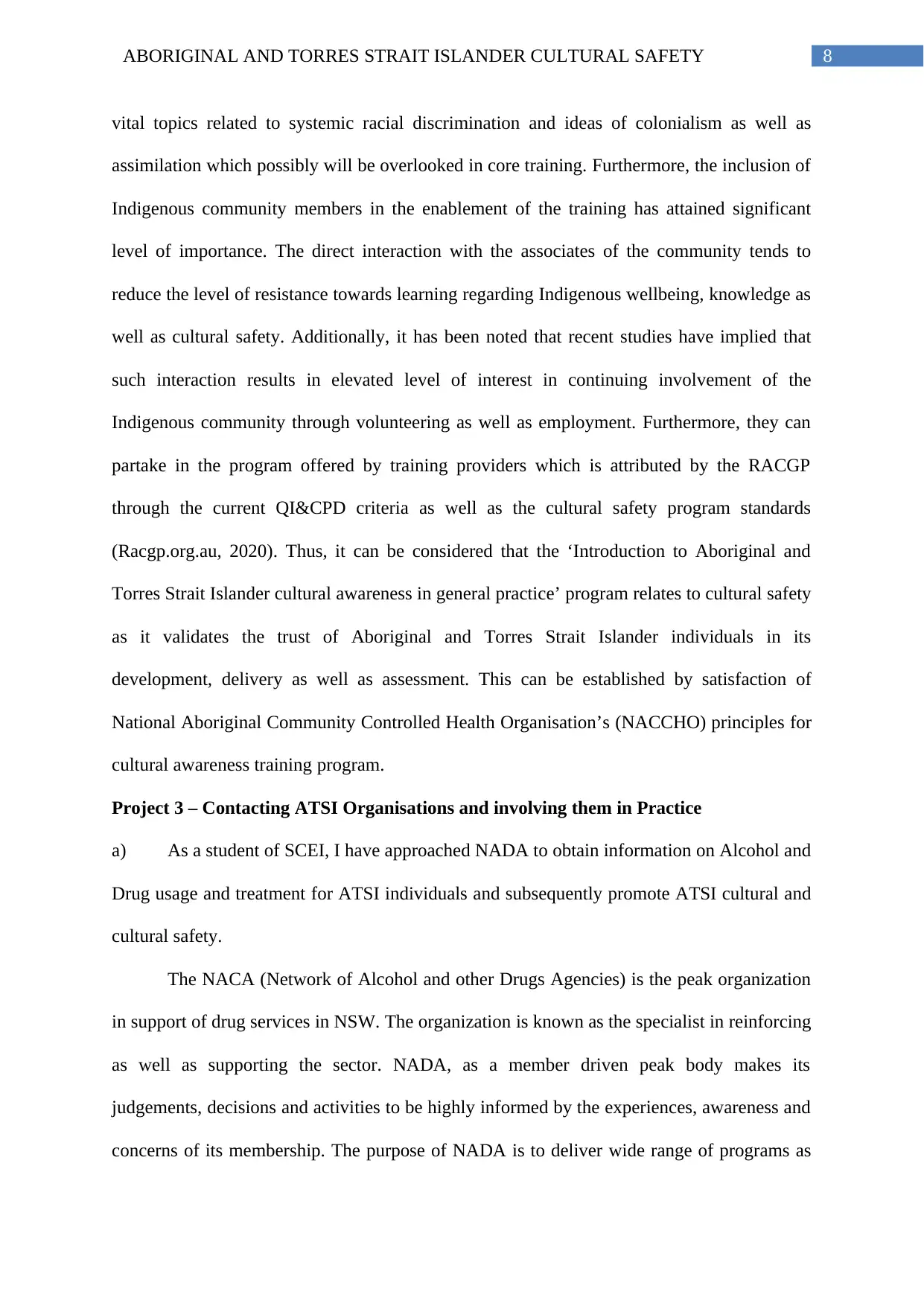
8ABORIGINAL AND TORRES STRAIT ISLANDER CULTURAL SAFETY
vital topics related to systemic racial discrimination and ideas of colonialism as well as
assimilation which possibly will be overlooked in core training. Furthermore, the inclusion of
Indigenous community members in the enablement of the training has attained significant
level of importance. The direct interaction with the associates of the community tends to
reduce the level of resistance towards learning regarding Indigenous wellbeing, knowledge as
well as cultural safety. Additionally, it has been noted that recent studies have implied that
such interaction results in elevated level of interest in continuing involvement of the
Indigenous community through volunteering as well as employment. Furthermore, they can
partake in the program offered by training providers which is attributed by the RACGP
through the current QI&CPD criteria as well as the cultural safety program standards
(Racgp.org.au, 2020). Thus, it can be considered that the ‘Introduction to Aboriginal and
Torres Strait Islander cultural awareness in general practice’ program relates to cultural safety
as it validates the trust of Aboriginal and Torres Strait Islander individuals in its
development, delivery as well as assessment. This can be established by satisfaction of
National Aboriginal Community Controlled Health Organisation’s (NACCHO) principles for
cultural awareness training program.
Project 3 – Contacting ATSI Organisations and involving them in Practice
a) As a student of SCEI, I have approached NADA to obtain information on Alcohol and
Drug usage and treatment for ATSI individuals and subsequently promote ATSI cultural and
cultural safety.
The NACA (Network of Alcohol and other Drugs Agencies) is the peak organization
in support of drug services in NSW. The organization is known as the specialist in reinforcing
as well as supporting the sector. NADA, as a member driven peak body makes its
judgements, decisions and activities to be highly informed by the experiences, awareness and
concerns of its membership. The purpose of NADA is to deliver wide range of programs as
vital topics related to systemic racial discrimination and ideas of colonialism as well as
assimilation which possibly will be overlooked in core training. Furthermore, the inclusion of
Indigenous community members in the enablement of the training has attained significant
level of importance. The direct interaction with the associates of the community tends to
reduce the level of resistance towards learning regarding Indigenous wellbeing, knowledge as
well as cultural safety. Additionally, it has been noted that recent studies have implied that
such interaction results in elevated level of interest in continuing involvement of the
Indigenous community through volunteering as well as employment. Furthermore, they can
partake in the program offered by training providers which is attributed by the RACGP
through the current QI&CPD criteria as well as the cultural safety program standards
(Racgp.org.au, 2020). Thus, it can be considered that the ‘Introduction to Aboriginal and
Torres Strait Islander cultural awareness in general practice’ program relates to cultural safety
as it validates the trust of Aboriginal and Torres Strait Islander individuals in its
development, delivery as well as assessment. This can be established by satisfaction of
National Aboriginal Community Controlled Health Organisation’s (NACCHO) principles for
cultural awareness training program.
Project 3 – Contacting ATSI Organisations and involving them in Practice
a) As a student of SCEI, I have approached NADA to obtain information on Alcohol and
Drug usage and treatment for ATSI individuals and subsequently promote ATSI cultural and
cultural safety.
The NACA (Network of Alcohol and other Drugs Agencies) is the peak organization
in support of drug services in NSW. The organization is known as the specialist in reinforcing
as well as supporting the sector. NADA, as a member driven peak body makes its
judgements, decisions and activities to be highly informed by the experiences, awareness and
concerns of its membership. The purpose of NADA is to deliver wide range of programs as
⊘ This is a preview!⊘
Do you want full access?
Subscribe today to unlock all pages.

Trusted by 1+ million students worldwide
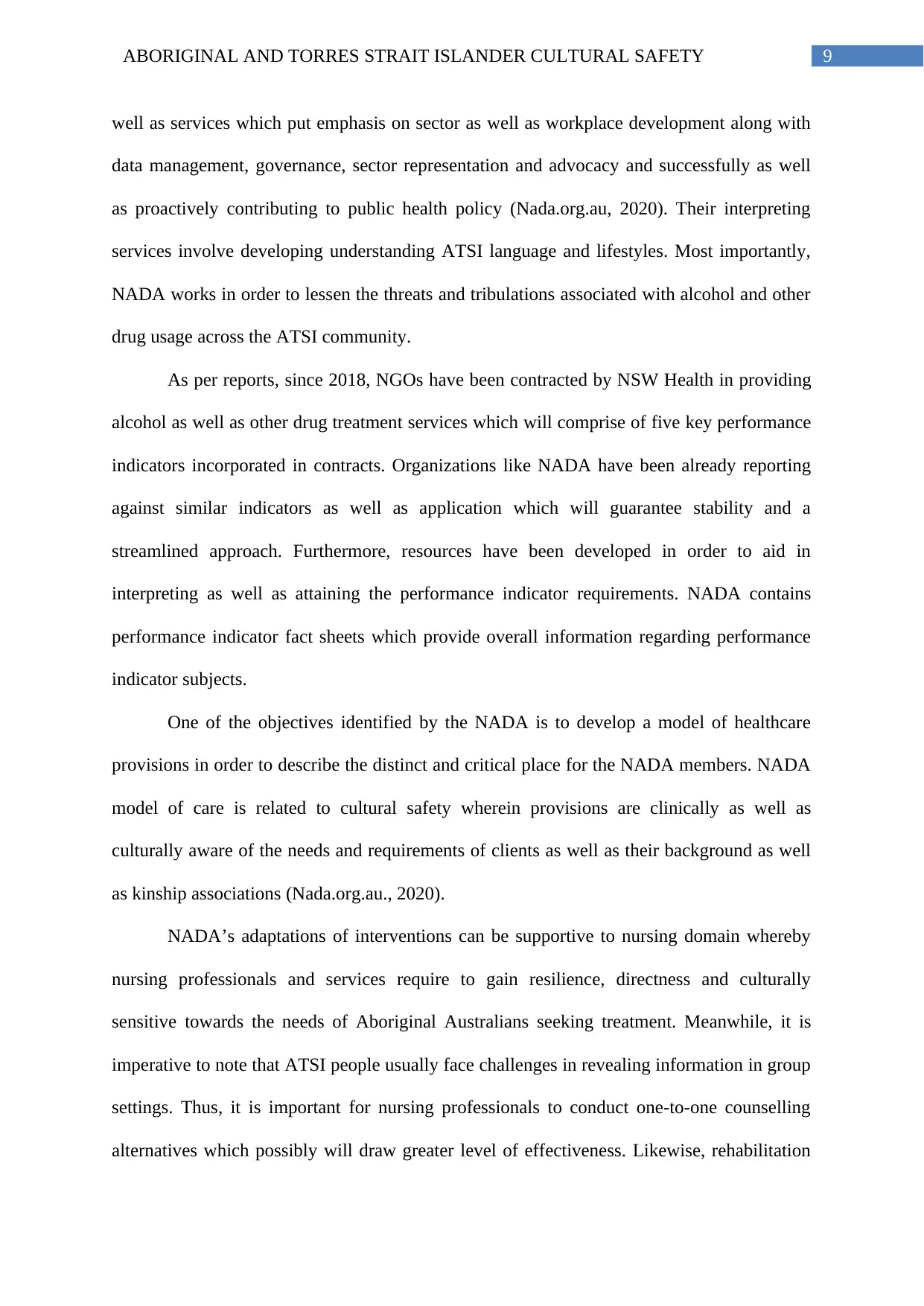
9ABORIGINAL AND TORRES STRAIT ISLANDER CULTURAL SAFETY
well as services which put emphasis on sector as well as workplace development along with
data management, governance, sector representation and advocacy and successfully as well
as proactively contributing to public health policy (Nada.org.au, 2020). Their interpreting
services involve developing understanding ATSI language and lifestyles. Most importantly,
NADA works in order to lessen the threats and tribulations associated with alcohol and other
drug usage across the ATSI community.
As per reports, since 2018, NGOs have been contracted by NSW Health in providing
alcohol as well as other drug treatment services which will comprise of five key performance
indicators incorporated in contracts. Organizations like NADA have been already reporting
against similar indicators as well as application which will guarantee stability and a
streamlined approach. Furthermore, resources have been developed in order to aid in
interpreting as well as attaining the performance indicator requirements. NADA contains
performance indicator fact sheets which provide overall information regarding performance
indicator subjects.
One of the objectives identified by the NADA is to develop a model of healthcare
provisions in order to describe the distinct and critical place for the NADA members. NADA
model of care is related to cultural safety wherein provisions are clinically as well as
culturally aware of the needs and requirements of clients as well as their background as well
as kinship associations (Nada.org.au., 2020).
NADA’s adaptations of interventions can be supportive to nursing domain whereby
nursing professionals and services require to gain resilience, directness and culturally
sensitive towards the needs of Aboriginal Australians seeking treatment. Meanwhile, it is
imperative to note that ATSI people usually face challenges in revealing information in group
settings. Thus, it is important for nursing professionals to conduct one-to-one counselling
alternatives which possibly will draw greater level of effectiveness. Likewise, rehabilitation
well as services which put emphasis on sector as well as workplace development along with
data management, governance, sector representation and advocacy and successfully as well
as proactively contributing to public health policy (Nada.org.au, 2020). Their interpreting
services involve developing understanding ATSI language and lifestyles. Most importantly,
NADA works in order to lessen the threats and tribulations associated with alcohol and other
drug usage across the ATSI community.
As per reports, since 2018, NGOs have been contracted by NSW Health in providing
alcohol as well as other drug treatment services which will comprise of five key performance
indicators incorporated in contracts. Organizations like NADA have been already reporting
against similar indicators as well as application which will guarantee stability and a
streamlined approach. Furthermore, resources have been developed in order to aid in
interpreting as well as attaining the performance indicator requirements. NADA contains
performance indicator fact sheets which provide overall information regarding performance
indicator subjects.
One of the objectives identified by the NADA is to develop a model of healthcare
provisions in order to describe the distinct and critical place for the NADA members. NADA
model of care is related to cultural safety wherein provisions are clinically as well as
culturally aware of the needs and requirements of clients as well as their background as well
as kinship associations (Nada.org.au., 2020).
NADA’s adaptations of interventions can be supportive to nursing domain whereby
nursing professionals and services require to gain resilience, directness and culturally
sensitive towards the needs of Aboriginal Australians seeking treatment. Meanwhile, it is
imperative to note that ATSI people usually face challenges in revealing information in group
settings. Thus, it is important for nursing professionals to conduct one-to-one counselling
alternatives which possibly will draw greater level of effectiveness. Likewise, rehabilitation
Paraphrase This Document
Need a fresh take? Get an instant paraphrase of this document with our AI Paraphraser
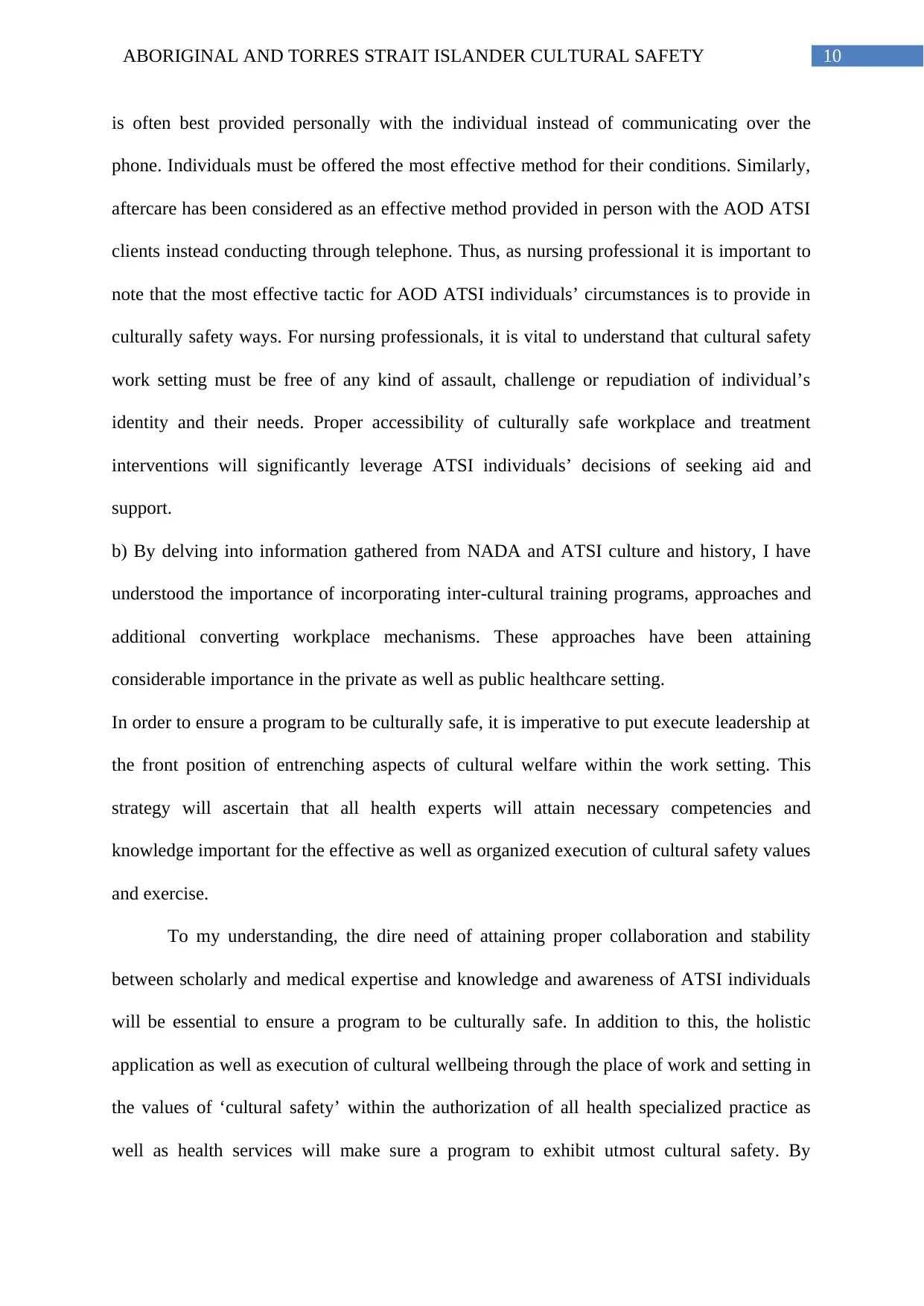
10ABORIGINAL AND TORRES STRAIT ISLANDER CULTURAL SAFETY
is often best provided personally with the individual instead of communicating over the
phone. Individuals must be offered the most effective method for their conditions. Similarly,
aftercare has been considered as an effective method provided in person with the AOD ATSI
clients instead conducting through telephone. Thus, as nursing professional it is important to
note that the most effective tactic for AOD ATSI individuals’ circumstances is to provide in
culturally safety ways. For nursing professionals, it is vital to understand that cultural safety
work setting must be free of any kind of assault, challenge or repudiation of individual’s
identity and their needs. Proper accessibility of culturally safe workplace and treatment
interventions will significantly leverage ATSI individuals’ decisions of seeking aid and
support.
b) By delving into information gathered from NADA and ATSI culture and history, I have
understood the importance of incorporating inter-cultural training programs, approaches and
additional converting workplace mechanisms. These approaches have been attaining
considerable importance in the private as well as public healthcare setting.
In order to ensure a program to be culturally safe, it is imperative to put execute leadership at
the front position of entrenching aspects of cultural welfare within the work setting. This
strategy will ascertain that all health experts will attain necessary competencies and
knowledge important for the effective as well as organized execution of cultural safety values
and exercise.
To my understanding, the dire need of attaining proper collaboration and stability
between scholarly and medical expertise and knowledge and awareness of ATSI individuals
will be essential to ensure a program to be culturally safe. In addition to this, the holistic
application as well as execution of cultural wellbeing through the place of work and setting in
the values of ‘cultural safety’ within the authorization of all health specialized practice as
well as health services will make sure a program to exhibit utmost cultural safety. By
is often best provided personally with the individual instead of communicating over the
phone. Individuals must be offered the most effective method for their conditions. Similarly,
aftercare has been considered as an effective method provided in person with the AOD ATSI
clients instead conducting through telephone. Thus, as nursing professional it is important to
note that the most effective tactic for AOD ATSI individuals’ circumstances is to provide in
culturally safety ways. For nursing professionals, it is vital to understand that cultural safety
work setting must be free of any kind of assault, challenge or repudiation of individual’s
identity and their needs. Proper accessibility of culturally safe workplace and treatment
interventions will significantly leverage ATSI individuals’ decisions of seeking aid and
support.
b) By delving into information gathered from NADA and ATSI culture and history, I have
understood the importance of incorporating inter-cultural training programs, approaches and
additional converting workplace mechanisms. These approaches have been attaining
considerable importance in the private as well as public healthcare setting.
In order to ensure a program to be culturally safe, it is imperative to put execute leadership at
the front position of entrenching aspects of cultural welfare within the work setting. This
strategy will ascertain that all health experts will attain necessary competencies and
knowledge important for the effective as well as organized execution of cultural safety values
and exercise.
To my understanding, the dire need of attaining proper collaboration and stability
between scholarly and medical expertise and knowledge and awareness of ATSI individuals
will be essential to ensure a program to be culturally safe. In addition to this, the holistic
application as well as execution of cultural wellbeing through the place of work and setting in
the values of ‘cultural safety’ within the authorization of all health specialized practice as
well as health services will make sure a program to exhibit utmost cultural safety. By
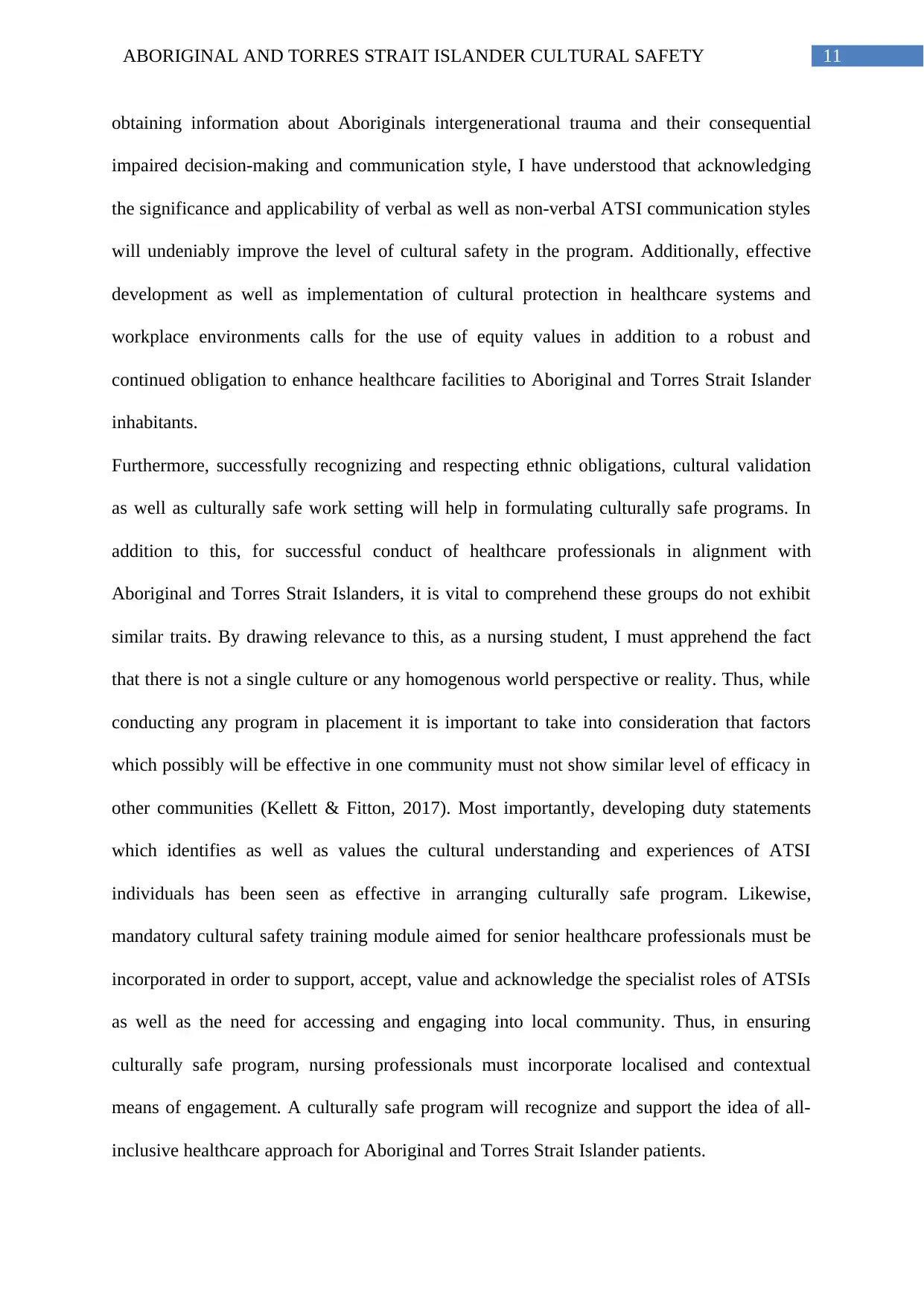
11ABORIGINAL AND TORRES STRAIT ISLANDER CULTURAL SAFETY
obtaining information about Aboriginals intergenerational trauma and their consequential
impaired decision-making and communication style, I have understood that acknowledging
the significance and applicability of verbal as well as non-verbal ATSI communication styles
will undeniably improve the level of cultural safety in the program. Additionally, effective
development as well as implementation of cultural protection in healthcare systems and
workplace environments calls for the use of equity values in addition to a robust and
continued obligation to enhance healthcare facilities to Aboriginal and Torres Strait Islander
inhabitants.
Furthermore, successfully recognizing and respecting ethnic obligations, cultural validation
as well as culturally safe work setting will help in formulating culturally safe programs. In
addition to this, for successful conduct of healthcare professionals in alignment with
Aboriginal and Torres Strait Islanders, it is vital to comprehend these groups do not exhibit
similar traits. By drawing relevance to this, as a nursing student, I must apprehend the fact
that there is not a single culture or any homogenous world perspective or reality. Thus, while
conducting any program in placement it is important to take into consideration that factors
which possibly will be effective in one community must not show similar level of efficacy in
other communities (Kellett & Fitton, 2017). Most importantly, developing duty statements
which identifies as well as values the cultural understanding and experiences of ATSI
individuals has been seen as effective in arranging culturally safe program. Likewise,
mandatory cultural safety training module aimed for senior healthcare professionals must be
incorporated in order to support, accept, value and acknowledge the specialist roles of ATSIs
as well as the need for accessing and engaging into local community. Thus, in ensuring
culturally safe program, nursing professionals must incorporate localised and contextual
means of engagement. A culturally safe program will recognize and support the idea of all-
inclusive healthcare approach for Aboriginal and Torres Strait Islander patients.
obtaining information about Aboriginals intergenerational trauma and their consequential
impaired decision-making and communication style, I have understood that acknowledging
the significance and applicability of verbal as well as non-verbal ATSI communication styles
will undeniably improve the level of cultural safety in the program. Additionally, effective
development as well as implementation of cultural protection in healthcare systems and
workplace environments calls for the use of equity values in addition to a robust and
continued obligation to enhance healthcare facilities to Aboriginal and Torres Strait Islander
inhabitants.
Furthermore, successfully recognizing and respecting ethnic obligations, cultural validation
as well as culturally safe work setting will help in formulating culturally safe programs. In
addition to this, for successful conduct of healthcare professionals in alignment with
Aboriginal and Torres Strait Islanders, it is vital to comprehend these groups do not exhibit
similar traits. By drawing relevance to this, as a nursing student, I must apprehend the fact
that there is not a single culture or any homogenous world perspective or reality. Thus, while
conducting any program in placement it is important to take into consideration that factors
which possibly will be effective in one community must not show similar level of efficacy in
other communities (Kellett & Fitton, 2017). Most importantly, developing duty statements
which identifies as well as values the cultural understanding and experiences of ATSI
individuals has been seen as effective in arranging culturally safe program. Likewise,
mandatory cultural safety training module aimed for senior healthcare professionals must be
incorporated in order to support, accept, value and acknowledge the specialist roles of ATSIs
as well as the need for accessing and engaging into local community. Thus, in ensuring
culturally safe program, nursing professionals must incorporate localised and contextual
means of engagement. A culturally safe program will recognize and support the idea of all-
inclusive healthcare approach for Aboriginal and Torres Strait Islander patients.
⊘ This is a preview!⊘
Do you want full access?
Subscribe today to unlock all pages.

Trusted by 1+ million students worldwide
1 out of 16
Related Documents
Your All-in-One AI-Powered Toolkit for Academic Success.
+13062052269
info@desklib.com
Available 24*7 on WhatsApp / Email
![[object Object]](/_next/static/media/star-bottom.7253800d.svg)
Unlock your academic potential
Copyright © 2020–2026 A2Z Services. All Rights Reserved. Developed and managed by ZUCOL.





